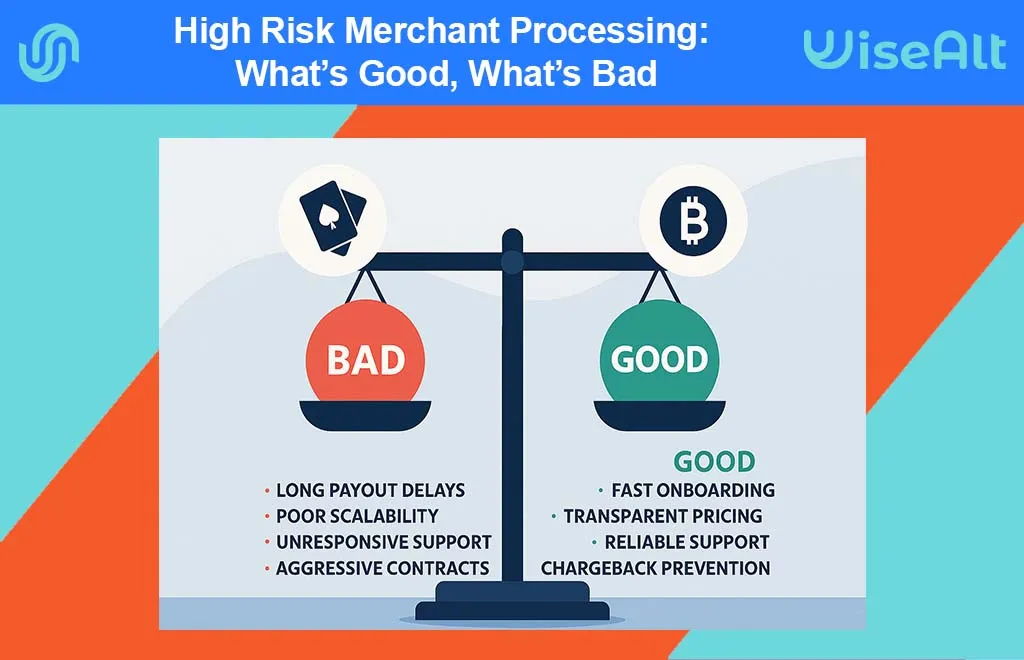Businesses in high-risk industries — from iGaming and Forex to crypto exchanges and adult content — rely on high risk merchant processing to accept payments. But not all providers are equal. Some empower your business to grow. Others create friction, delays, or even put your funds at risk.
So, how do you know if you’re getting a good deal or walking into a payment nightmare?
This guide breaks down:
- The key characteristics of a good vs. bad high-risk payment processor;
- A checklist of what to ask and verify before signing;
- Common red flags and issues to avoid.
Let’s dive in.
What Is Good High Risk Merchant Processing?
Reliable high-risk processors offer far more than just approval. Here’s what defines a strong partner:
✔️ Fast & Flexible Onboarding
A good processor understands your industry. They don’t ask irrelevant questions or endlessly delay approval. Expect KYC and compliance, but not bureaucracy.
✔️ Experience with Your Industry
Whether you’re in adult, gambling, crypto, or supplements, they’ve seen it before. That means fewer surprises and tailored support.
✔️ Transparent Pricing
Clear fees for setup, rolling reserves, chargebacks, and monthly volume. No hidden “compliance” surcharges.
✔️ Technical Reliability
You get:
- 99.99% uptime
- High approval ratios
- PCI DSS compliance
- Load balancing or smart routing (if needed)
- API and plugin integrations for major platforms
✔️ Multiple Payment Methods
Cards, SEPA, SWIFT, alternative payments (APMs), wallets, and even crypto — all in one dashboard.
✔️ Support That Actually Helps
24/7 access to human support, not bots. Plus, proactive fraud alerts, and a dedicated manager for your account.
✔️ Chargeback Prevention Tools
Smart tools that detect fraud, trigger 3DS when needed, and help you dispute chargebacks effectively.
What Is Bad High Risk Merchant Processing?
Here are some warning signs you might be dealing with a subpar or even dangerous provider:
Long Delays in Payouts
If you’re constantly chasing settlements, that’s a big red flag. Especially if they hold funds without transparent justification.
Poor Scalability
If their system goes down during peak times, or they can’t handle growing volume — it’s not built for serious business.
Unresponsive or Scripted Support
Support should not read from a manual. If your emails or urgent tickets go unanswered, your business is at risk.
Poor Documentation or API Integration
If your developers struggle to integrate, or documentation is outdated or inconsistent — expect more problems down the road.
Too Many Middlemen
Some providers re-route through multiple PSPs or acquirers, creating latency, data leaks, and revenue loss.
Aggressive Contract Terms
Watch for:
- Long lock-ins
- High termination fees
- No ownership of your MID
- No clear reserve release policy
Provider Evaluation Checklist
Use this checklist before choosing any high risk payment processor:
| Criterion | Good Sign | Red Flag |
|---|---|---|
| Onboarding Time | 10–15 business days | 20+ business days, repeated KYC requests |
| Support | 24/7 with dedicated manager | Slow, email-only, no human escalation |
| Settlement Speed | Daily, weekly, or on request | Delayed, unclear schedules |
| Chargeback Tools | Included, proactive detection | None, or extra cost |
| Gateway Features | APIs, APMs, fraud tools, smart routing | Only basic card processing |
| Pricing | Transparent, volume-based | Hidden fees, unclear reserves |
| Contracts | Monthly or quarterly, no extreme lock-in | Long-term with exit penalties |
| Reputation | Reviews on forums, case studies, testimonials | No verifiable reviews, offshore secrecy |
Key Questions to Ask Any High-Risk Processor
- Do you specialize in my industry (e.g., iGaming, crypto, adult)?
- What is your average onboarding time for high-risk merchants?
- Can I choose between acquirers or payment routes?
- How do you handle chargebacks?
- What are your settlement cycles?
- Do you provide smart routing or fallback options?
- Where are your acquiring banks located?
- What reserves do you hold and for how long?
- Do you support multiple currencies and APMs?
- Is support available 24/7 and in which languages?
If a provider can’t answer these, walk away.
Common High Risk Processing Problems
Even with the best intentions, issues can arise. Be prepared for:
- Unexpected Holds or Freezes — usually due to compliance or chargeback spikes.
- Inadequate Volume Allocation — you outgrow the setup and start seeing declines.
- Mismatch Between Processing Capabilities and Industry Needs — e.g., gambling site using a retail gateway.
- Fraud Exposure — no proactive monitoring or fraud alerts.
- Regulatory Gaps — processing through unstable or blacklisted jurisdictions.
Additional Reading from Trusted Sources
To learn more about industry trends and regulatory considerations, explore:
Final Thoughts
Choosing the right high risk merchant processing partner is critical. A good processor enables your growth, supports your compliance, and protects your cash flow. A bad one can freeze your funds, damage your reputation, or lose you customers.
Vet carefully, ask the right questions, and prioritize support, scalability, and transparency. Consult with experts likeWiseAltif you need assistance.


